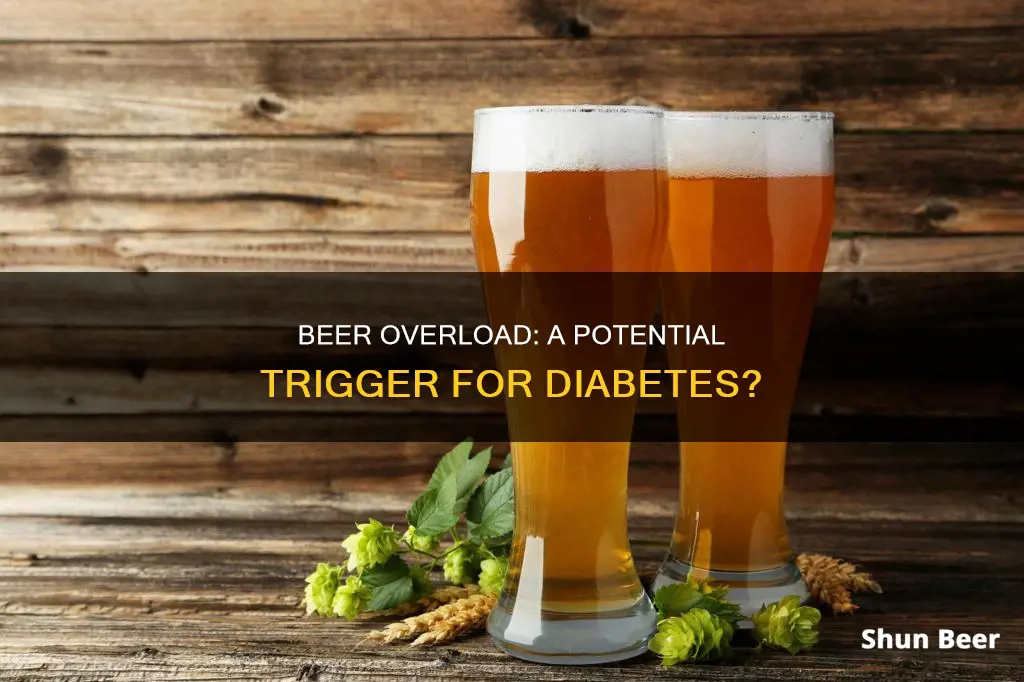
Drinking beer, or any alcoholic beverage, can have a significant impact on diabetes management and can even increase the risk of developing type 2 diabetes. Alcohol affects the liver's ability to regulate blood sugar, and can cause blood glucose levels to rise or fall, depending on how much one consumes. For people with diabetes, this interference with blood sugar levels can be dangerous and even life-threatening. Additionally, alcoholic drinks are often high in calories, which can contribute to weight gain and further increase the risk of type 2 diabetes. While moderate alcohol consumption may not raise the risk, heavy drinking is certainly detrimental and can lead to various health complications.
| Characteristics | Values |
|---|---|
| Alcohol's impact on blood sugar | Alcohol can cause blood sugar levels to rise or fall, depending on how much you drink. |
| Alcohol's interaction with diabetes medications | Alcohol combined with certain medications can lead to hypoglycaemia or "insulin shock", a medical emergency. |
| Alcohol's effect on liver function | Alcohol prevents the liver from regulating blood sugar and producing glucose. |
| Alcohol consumption on an empty stomach | Drinking on an empty stomach can cause hypoglycaemia. |
| Alcohol's impact on weight | Alcoholic drinks are often high in calories and can lead to weight gain, a risk factor for type 2 diabetes. |
| Alcohol's effect on neuropathy | Alcohol can worsen nerve damage caused by diabetes. |
| Alcohol's impact on eye health | Heavy alcohol consumption may increase the risk of diabetic eye disease and retinopathy. |
What You'll Learn

Alcohol interacts with diabetes medications
It is important for individuals with diabetes to understand how alcohol interacts with their specific medications. They should discuss their alcohol consumption with their healthcare provider and carefully follow any guidelines provided for moderate drinking. Moderate alcohol consumption generally does not affect blood glucose levels if diabetes is under control, but excessive drinking can lead to unpredictable blood sugar levels and increase the risk of diabetes-related complications.
The effects of alcohol on blood sugar levels can vary depending on nutritional status, the amount of alcohol consumed, and resulting blood alcohol concentration. Alcohol can either reduce blood sugar levels or have no effect at all. However, for individuals with diabetes, alcohol can make controlling blood sugar more challenging. Well-fed individuals with diabetes who drink alcohol may develop dangerously high blood sugar levels, while undernourished individuals may experience dangerously low blood sugar levels.
It is worth noting that alcohol consumption guidelines for individuals with diabetes typically recommend limiting consumption to one drink per day for women and up to two drinks per day for men. It is crucial to avoid drinking on an empty stomach, staying hydrated, and including the carbohydrates from alcoholic beverages in the daily carbohydrate count. Additionally, monitoring blood sugar levels before, during, and after drinking alcohol is essential.
The Magic of Beer Thieves: How Do They Work?
You may want to see also

Alcohol prevents the liver from regulating blood sugar
Alcohol can have a significant impact on blood sugar levels, particularly for those with diabetes. The liver is crucial in maintaining healthy blood sugar levels by storing and producing glucose. However, when an individual consumes alcohol, the liver's priority shifts to breaking it down, which inhibits its ability to release sufficient glucose, leading to a potential drop in blood sugar levels. This effect can last for several hours after drinking, and the risk is heightened if alcohol is consumed on an empty stomach or when blood sugar is already low.
The impact of alcohol on blood sugar is twofold. Firstly, alcoholic drinks themselves often contain high levels of sugar, particularly cocktails, cream liqueurs, and dessert wines. This can cause an initial spike in blood sugar levels as this sugar enters the bloodstream. Secondly, as the liver focuses on breaking down alcohol, it may not release enough glucose to maintain healthy blood sugar levels, especially in individuals whose medication increases insulin production. This can lead to a more prolonged drop in blood sugar, known as hypoglycemia, which can be dangerous if left untreated.
For those with diabetes, it is essential to monitor blood sugar levels when consuming alcohol and to be aware of the potential interaction with diabetes medications, particularly insulin. According to the American Diabetes Association, it is safe for women with diabetes to consume up to one drink per day, but it is important to avoid drinking on an empty stomach or when blood sugar levels are already low. For those without diabetes, alcohol is unlikely to cause hypoglycemia, but excessive drinking may increase the risk of developing type 2 diabetes.
Plants and Beer: A Refreshing Combination?
You may want to see also

Drinking on an empty stomach increases the risk of hypoglycaemia
Drinking on an empty stomach can increase the risk of hypoglycaemia, or low blood sugar. Hypoglycaemia is a condition where blood sugar levels fall below the optimum level. While this condition mostly affects people with diabetes, it can also impact those without the disease.
The liver is responsible for stabilising blood sugar levels and eliminating toxins from the body. When you consume alcohol, the liver focuses on breaking it down, potentially neglecting its role in maintaining blood sugar levels. This can lead to a drop in blood sugar, resulting in hypoglycaemia.
Drinking on an empty stomach exacerbates this issue by making it more challenging for the liver to release glucose into the bloodstream. As a result, drinking alcohol without eating beforehand can significantly increase the risk of hypoglycaemia.
People with diabetes are particularly vulnerable to hypoglycaemia when drinking on an empty stomach. Their liver may struggle to produce enough glycogen to prevent blood sugar levels from dropping too low. Additionally, those with diabetes who go to bed without consuming additional carbohydrates may experience low blood sugar levels overnight.
To reduce the risk of hypoglycaemia, it is recommended to eat before drinking, ensuring your meal contains carbohydrates. This will provide your body with enough glucose, allowing your liver to release glucose into the bloodstream even while processing alcohol. However, it's important to note that eating before drinking does not guarantee that your blood sugar levels will remain stable. Moderation in alcohol consumption is always advised.
If you have diabetes and choose to drink alcohol, it is crucial to closely monitor your blood sugar levels before and during drinking. Additionally, always carry rapid-acting carbohydrates, such as glucose tablets or fruit juice, to treat low blood sugar levels promptly.
Beer Drinking: Healthy Habit or Health Hazard?
You may want to see also

Alcohol can cause weight gain, increasing the risk of type 2 diabetes
Alcoholic drinks are often high in calories. For example, a pint of lager has a similar number of calories to a slice of pizza. Consuming excess calories can lead to weight gain, which is a risk factor for type 2 diabetes.
Drinking above the UK Chief Medical Officers' (CMOs') low-risk guidelines increases your risk of developing type 2 diabetes. Regular heavy drinking can reduce the body's sensitivity to insulin, which can trigger type 2 diabetes.
According to the American Diabetes Association (ADA), zero alcohol consumption increases the risk of type 2 diabetes. However, moderate alcohol consumption does not raise the risk of type 2 diabetes; heavy consumption does. The ADA recommends limiting consumption to one drink per day for females and up to two per day for males.
Alcohol can also negatively impact blood sugar control in people with diabetes. It can cause blood glucose levels to rise or fall, depending on how much you drink and whether you've eaten. Alcohol can lead to hypoglycaemia, or 'insulin shock', which is a medical emergency.
Anesthesia and Alcohol: Safe to Drink Beer Post-Procedure?
You may want to see also

Heavy drinking can cause ketoacidosis
Alcoholic ketoacidosis is a serious and life-threatening complication that can develop when the body doesn't have enough insulin to allow blood sugar into cells to be used as energy. In response to this lack of insulin and energy, the liver may excessively convert fatty acid molecules into ketone bodies, which can have severe health consequences.
Heavy alcohol consumption, such as 16 or more standard drinks per day, can increase the risk of ketoacidosis in diabetics. It is caused by the combined effects of alcohol and starvation on glucose metabolism. Typically, an alcohol binge leads to vomiting and the cessation of food intake for at least 24 hours. During this period of starvation, vomiting continues, and abdominal pain develops, leading the patient to seek medical attention.
The diagnosis of alcoholic ketoacidosis requires a high index of suspicion. It is made through the patient's history and findings of ketoacidosis without hyperglycemia. Treatment involves the administration of an IV saline solution and dextrose infusion.
The absence of hyperglycemia makes diabetic ketoacidosis improbable. However, patients with mild hyperglycemia may have underlying diabetes mellitus, which can be recognised by elevated levels of glycosylated haemoglobin. Laboratory findings typically associated with alcoholic ketoacidosis include high anion gap metabolic acidosis, ketonemia, and ketonuria.
To prevent alcoholic ketoacidosis, it is important to limit alcohol consumption and seek medical attention if symptoms such as agitation, confusion, fatigue, rapid breathing, or dehydration occur.
Beer and Celebrex: Is It Safe to Drink Alcohol?
You may want to see also







